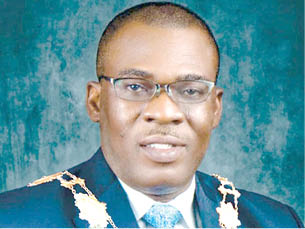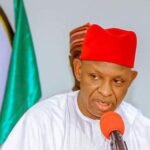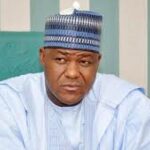The immediate past president of the Chartered Institute of Taxation of Nigeria (CITN), Mr Adesina Adedayo, in this interview with Weekend Trust, said the controversy over the newly introduced Tax Reform Bills in the National Assembly is driven by lack of understanding.
Debate has been raging over the new Tax Reform Bills presented to the National Assembly by the executive. What are your thoughts on them?
I have been following the presentation right from the activities of the presidential committee and it is clear that a lot of things are going to change the foundational issues that need to be addressed in order for us to determine the growth of the new economy. For us to grow, we need to do things in a way that show that we are future ready, and that means that a lot of these things require us not to be looking at, one thing in this law and another thing in the other law. That is one thing you have to give kudos to the presidential committee for.
I will technically say that the new bills are like a new dawn. And they are citizen-centred because I have gone through them. I have reviewed them and listened to the chairman of the committee, Taiwo Oyedele, and realised that the focus is on the citizen. Why is it focused on the citizen? I realised that the poverty level is high, and for us to move forward, we need to start addressing things that make citizens have a simplistic view of a lot of things and know where their sustainability lie because it is a stakeholders’ model. So, to that extent, I agree with a lot of the issues that are there.
- Convince opponents of tax reform with data – Dasuki
- North is not only region kicking against tax bills — Prof. Dogarawa
One of the contentious issues surrounding the bills is the proposal to tinker with the Value Added Tax (VAT) distribution formula, using the derivation-based model for distribution in Nigeria; what’s the way to go, considering the controversies it has generated?
You are very correct; it is still generating controversy and that has to do with both perspective and understanding. There is a simulation model that was even shown that, ‘look this is the existing model.’ This is the effect of the existing model. It may end up benefitting you more than the existing model.
So, why we are having controversy is because of the issue of data, the issue of making sure that what we are putting across is acceptable and based on reliable input. This is what is making people say, ‘this is looking controversial.’ Why don’t you focus on equality? So they are talking about equity. It looks almost the same but the fact of the matter is that we have a situation where Lagos is industrialised and based on the fact of this, a lot of things come because their (companies’) head offices are in Lagos.
Now, this bill is saying, let us know where they are consumed because VAT is a consumption tax. Once we know where they are consumed, it is going to help us to ensure fairness, to ensure that what is produced in Lagos will not necessarily be consumed in Lagos, and if we have all the data relating to this issue, by the time we look at the allocation and the distribution, it would help us, having an idea of where it is being consumed. It is the challenge of the unknown that is leading to the controversy. I have followed the discussion, I have followed members of the committee and if you could recall CITN is equally a member of that committee.
Now, the government is talking about stopping multiple taxation; looking at the move to harmonise tax collection in Nigeria, what do you think is wrong with the existing tax system?
We got it wrong in the past and we are trying to correct it from the foundational level, and with the level of the engagement with the committee and various international experts, it is a single-digit kind of tax, they don’t go beyond nine types of taxation. Now, in the Nigerian case, for crying out loud, let us know the taxes we need to collect and let the other agencies get their own through that same pool model.
If that multiple taxation is not addressed, you start getting scared. You grow up and it becomes strange to you, ‘what taxes am I paying, what levies am I liable to pay?’ This is because even the non-state actors are constituting a mafia on their own. But if we now have a regulation that stipulates the maximum tax, I am going to pay; it makes things easy. If I were to pay nine taxes, I would have at the back of my mind that I must be ready to pay nine specific taxes and get an expert to advise me. But in the Nigerian situation, we have so many taxes and so many are even still coming up, and if you are not careful, the experts cannot say they know all the taxes you are supposed to pay because even the agbero taxes would still come.
According to the Northern Elders Forum, the new tax reform bills are poorly conceived and divisive. What do you think is fuelling this opposition?
I will try not to dwell on the political end of the conversation, but I will dwell on the fiscal end of it. Naturally, when it comes to the issue of distribution of revenue and the issue of equity and equality, this will come up with the issue of federal character in order to create balance, considering how we talk about tax and development, which is the challenge now.
While I am not armed with statistics to defend myself here, when you look at the Nigerian structure at the moment, the level of out-of-school children is mostly in the North. The North has the land but the issue of development in terms of industry is mostly in the South, and when you are talking tax and so many other things, you have a situation where they are not feeling comfortable; ‘what is likely to happen to us in terms of the revenue that comes to our side?’
This is the challenge now and it requires the committee to disabuse their minds with figures and facts because these issues cannot be dealt with emotionally, you have to say, ‘look, you are still better off.’
It is something good that is about to happen because this is not a southern agenda. It is a national interest agenda because ultimately, people will know where they belong as far as how they are handling our revenue is concerned. The truth is that what we are going to end up dividing among the states is something that is collected by the country; therefore, we must be fair and we must be equitable. That is the challenge of the conversation now—fair and equitable.
There are people who believe that the move to change the name of the Federal Inland Revenue Service (FIRS) is aimed at marginalising the states, which is against the principle of federalism.
Right from the conversation on the issue of VAT, a lot of us believe that some taxes are better administered by the Federal Inland Revenue Service because of the overall impact on the country. Look at Lagos and Ogun states, for example, which share borders – some people are living in Ogun State and working in Lagos. You now find out that sooner or later, it is going to lead to a fiscal conflict. While you are expected to pay tax in the state of your residence, some employers based in Lagos find it convenient to pay in the state. That is an example.
Back to what we are talking about, the fact of the matter is that as much as possible, when you call it the Nigerian Revenue Service, it doesn’t take away the jurisdictional authority of the Lagos Internal Revenue Service. You will see that the word is “internal” which is what belongs to Lagos, for instance. Inland revenue belongs to the federal government but the word does not carry the responsibilities of the FIRS effectively. They are responsible for everything that has to do with the Federal Government of Nigeria, which is one. Again, they are equally responsible for everything that has to do with the federation; and that is where we are having the Federation Account Allocation Committee (FAAC). These are things that have to come up with an appropriate name.
Tax evasion is a major issue in Nigeria’s tax system; how do we deepen compliance?
Tax evasion can be minimised when people start seeing the impact of governance. They need to see transparency, accountability and effective utilisation of the taxes. The more you see what the government is doing, you would even feel guilty if you are in the evasion category. That is on the moral side. Now, to the intelligence side, as much as possible, when people realise that they don’t need to come after you in order to get an idea of what you are earning, you put your children in expensive schools, where you are paying N5 million per annum, you cannot come and declare to the government that you are only earning N2.5 million. How is that possible when your expenditure is talking about N25 million? We need to work with data in order to make sure that evasion is minimised.

 Join Daily Trust WhatsApp Community For Quick Access To News and Happenings Around You.
Join Daily Trust WhatsApp Community For Quick Access To News and Happenings Around You.


